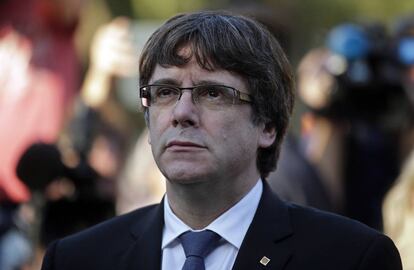Catalonia: The countdown to Article 155
The regional premier has been given more time this week to avoid the central government’s response to the secessionist challenge

This is the start of a decisive week. Today saw the end of the first deadline set by the central government for the Catalan premier, Carles Puigdemont, to reverse his journey toward the disconnection of the region from Spain, or to continue forward and declare independence. Whatever the case, the application of Article 155 of the Constitution, which has already been brought into play by Prime Minister Mariano Rajoy, is now coming ever closer. The pro-independence movement encouraged by Puigdemont’s minority government, and his partners, the far-left anti-capitalist CUP party, will still have another four days to avoid the imposition of a measure that will, inevitably, reduce the self-government for Catalonia given to it by the Spanish Constitution and the regional Statute until now.
If he continues on his path, Puigdemont will have committed a historic error, from which Catalonia and the rest of Spain will emerge very badly
If he continues on his path, Puigdemont will have committed a historic error, from which Catalonia and the rest of Spain will emerge very badly. His challenge, based on a social movement that does not even account for 50% of voters according to the last regional elections, is pushing this crisis into a blind alley, one in which Article 155 is looming as the only way to defend the rule of law, without the need to resort to much more traumatic measures, such as a state of alert, emergency or siege (covered by Article 116 of the Spanish Constitution).
The constitutional mandate of Article 155 is open. It leaves to the discretion of the executive the delicate task of carefully and proportionally intervening. It has within its powers anything from the dissolution of parliament, to the stripping of pro-secessionist leaders’ powers, as well as taking control of public order. The participation of the autonomous regions’ authorities in the process, and of the Senate, where pro-independence parties are represented, will show that the pro-independence forces are not just facing off against the central powers, but also against the state as a whole, and that there is room for negotiation and the obvious recourse to the courts against the adopted measures.
The central government’s ultimatum is still an opportunity that Puigdemont would do well to accept. Weeks after the fraudulent approval of the breakaway laws on September 6 and 8 in the Catalan parliament, and the simulated referendum of October 1, the limbo in which Catalonia has been left, with a suspended independence that could be applied at any moment, has created a catastrophic situation in political and economic terms.
The state cannot permit the existence of an alternative legality in one of its territories
The state cannot permit the existence of an alternative legality in one of its territories, which means that it has no other option but to use the democratic instruments that the Constitution grants it to re-establish normality. It should be said that Article 155 is similar to provisions that other European Constitutions enjoy, and its aim is not to shut down or curtail the autonomy of any region, but rather to defend it from the despotism and contempt for the law that Puigdemont, his government and his supporters in parliament have been displaying for many years.
The regional premier should understand that as such, when he calls for dialogue, it is essential that he first meet the condition of turning back on the road so far taken: there cannot be any other kind of dialogue that does not take place within the framework of the law, and it must be carried out within Spain’s lower house, the Congress of Deputies, with the participation of all the parties that are represented there. Democratic dialogue cannot be held between the regional government’s seat of power, and the central government’s seat of power. Not even the Spanish prime minister has the power to negotiate national sovereignty. Most likely the start of a political solution will have to come sooner or later (hopefully sooner) via the calling of elections, in Catalonia first and in all of Spain later, and that allows all citizens to have their say and for there to be a far-reaching renewal of the political class – which is losing more and more prestige in the eyes of the majority of citizens as each day passes.
English version by Simon Hunter.
Tu suscripción se está usando en otro dispositivo
¿Quieres añadir otro usuario a tu suscripción?
Si continúas leyendo en este dispositivo, no se podrá leer en el otro.
FlechaTu suscripción se está usando en otro dispositivo y solo puedes acceder a EL PAÍS desde un dispositivo a la vez.
Si quieres compartir tu cuenta, cambia tu suscripción a la modalidad Premium, así podrás añadir otro usuario. Cada uno accederá con su propia cuenta de email, lo que os permitirá personalizar vuestra experiencia en EL PAÍS.
¿Tienes una suscripción de empresa? Accede aquí para contratar más cuentas.
En el caso de no saber quién está usando tu cuenta, te recomendamos cambiar tu contraseña aquí.
Si decides continuar compartiendo tu cuenta, este mensaje se mostrará en tu dispositivo y en el de la otra persona que está usando tu cuenta de forma indefinida, afectando a tu experiencia de lectura. Puedes consultar aquí los términos y condiciones de la suscripción digital.








































